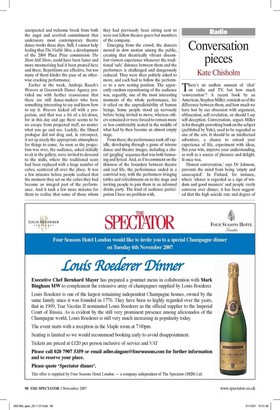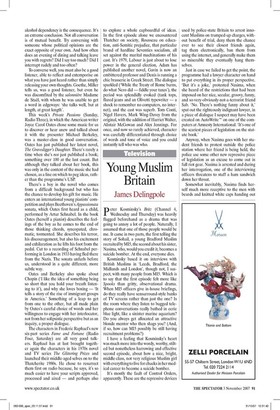Conversation pieces
Kate Chisholm There's an endless amount of 'chat' on radio and TV, but how much 'conversation'? A recent book by an American, Stephen Miller, reminds us of the difference between them, and how much we have lost by our obsession with argument, obfuscation, self-revelation, or should I say self-deception. Conversation, argues Miller in his thought-provoking book on the subject (published by Yale), used to be regarded as one of the arts. It should be an intellectual adventure, a chance to extend your experience of life, experiment with ideas, flex your wits, improve your understanding, as well as a source of pleasure and delight. It once was.
'Honest conversation,' says Dr Johnson, prevents the mind from being 'empty and unoccupied'. In Finland, for instance, where 'silence is regarded as a sign of wisdom and good manners' and people rarely converse over dinner, it has been suggested that the high suicide rate and degree of alcohol dependency is the consequence. It's an extreme conclusion. Not all conversation is of mutual benefit. Try conversing with someone whose political opinions are the exact opposite of your own. And how often does an evening of dining and talking leave you with regrets? Did I say too much? Did I interrupt rudely and too often?
To converse well, you must also be a good listener, able to reflect and extemporise on what you have just heard rather than simply releasing your own thoughts. Goethe, Miller tells us, was a good listener, but even he was discomfited by the salonniere Madame de Stael, with whom he was unable to get a word in edgeways: 'she talks well, but at length, at great length'.
This week's Private Passions (Sunday, Radio Three), in which the American writer Joyce Carol Oates chose some music for us to discover or hear anew and talked about it with the presenter Michael Berkeley, was a master-class in good conversation. Oates has just published her latest novel, The Gravedigger's Daughter. There's rarely a time when she's not just published a book; something over 100 at the last count. But although they talked about her book, this was only in the context of the music she had chosen, as a line on which to peg ideas, rather than the programme's USP.
There's a boy in the novel who comes from a difficult background but who has the chance to develop his gift for music. He enters an international young pianists' competition and plays Beethoven'sAppassionata sonata, which Oates first heard as a child, performed by Artur Schnabel. In the book Oates (herself a pianist) describes the feelings of the boy as he comes to the end of those thinking chords, syncopated, chromatic, tormented. She describes his terror, his discouragement, but also his excitement and exhilaration as he lifts his foot from the pedal. Cut to a recording of Schnabel performing in London in 1933 having fled there from the Nazis. The sonata unfurls before us, understood in a quite different, more subtle way.
Oates and Berkeley also spoke about Chopin (I like the idea of something being so short that you hold your breath listening to it'), and why she loves boxing — 'It tells a story of the rise of immigrant groups in America.' Something of a leap to get from one to the other, but all made plain by Oates's careful choice of words and her willingness to engage with her interlocutor, not from her solipsistic perspective but as an inquiry, a proper dialogue.
The characters in Frederic Raphael's new six-part series Fame and Fortune (Radio Four, Saturday) are all very good talkers. Raphael has at last brought together again the characters in his 1970s novel and TV series The Glittering Prizes and launched their middle-aged selves on to the Thatcherite 1980s. He chose to resurrect them first on radio because, he says, it's so much easier to have your scripts approved, processed and aired — and perhaps also to explore a whole cupboardful of ideas. In the first episode alone we encountered Thatcher on society, Rousseau on education, anti-Semitic prejudice, that particular brand of hardline Seventies socialism, all set against the marital machinations of his cast. It's 1979, Labour is just about to lose power in the general election, Adam has published another novel, Gavin is now an embittered professor and Denis is running a chic brasserie in Greek Street. The dialogue sparkled ('While the Treaty of Rome burns, do what Nero did — fiddle your taxes'), the period was splendidly evoked (tank tops, flared jeans and an Olivetti typewriter — a shock to remember no computers, no internet), and the cast was superb. Tom Conti, Nigel Havers, Mark Wing-Davey from the original, with the addition of Harriet Walter, Alistair McGowan and Alex Jennings. For once, and now so rarely achieved, character was carefully differentiated through choice of words and tone of voice and you could instantly tell who was who.













































































 Previous page
Previous page